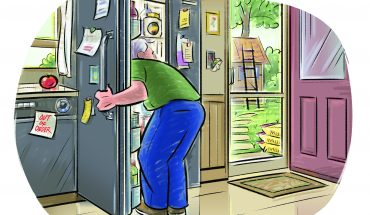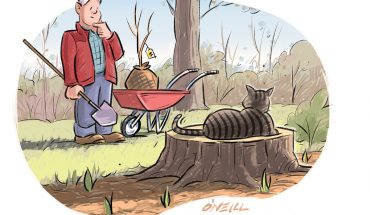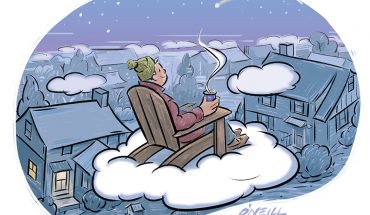I need to remember to hold my eyes and heart open to the wonder of the world — just as my father did
by Jim Dodson

For years, I’ve joked that my late father was an adman with a poet’s heart. He never failed to quote some ancient sage or dead philosopher when you least expected it.
As a know-it-all teenager, alternately amused and mortified by his endlessly upbeat personality, I gave him the nickname “Opti the Mystic.”
It took me growing up to finally realize what an extraordinary gift he was to me and anyone lucky enough to know him. When I was still pretty small, he hung two framed items on my bedroom wall.
One was the poem If, by Rudyard Kipling, maybe the best life and career advice a father ever gave his son or daughter on how to walk with kings, but keep the common touch.
The other was a quote by the ancient Chinese philosopher Mencius, a student of Confucius: “The great man is he who does not lose his child’s heart,” which confused me until my dad explained:
“Philosophy is designed to make you think. Some might think it simply means you should guard your child’s heart from growing cynical about life. I think it means that it’s wise to keep your own child-like sense of wonder — whatever age you are.”
My parents also gave me a set of the How and Why Wonder Books, a popular illustrated series designed to teach history and science to young people in the 1960s. The volumes made me take the idea of wonder quite seriously. My mother said she always “wondered” what I was going to ask her next. In truth, I was something of a wondrous pest.
I wondered typical kid things, like why the sky was so blue and why I had to wear shoes to church in summer — why I even had to go to church in summer when the outdoor world was so green and inviting.
Naturally, I wondered about what made the seasons change and the stars move and where hurricanes come from. When a mountainous press foreman at my dad’s newspaper informed me that we lived smack in the middle of something called “Hurricane Alley” in Mississippi, I ordered a hurricane emergency kit from National Geographic in case one struck our coast.
To my regret — though probably good fortune — no hurricane came. Thanks to the How and Why Wonder Books, I became an avid reader at age 5.
But I often wondered about things the wonder books couldn’t explain. Like why Mr. Sullivan, who lived alone two houses down, was suddenly building a bomb shelter in his backyard — and why he believed “Russian spies were everywhere.” Or what the vacation Bible school teacher was talking about when she said, “Jesus sees everything you do and writes it down for later.” It made Jesus sound like a Russian spy, not a prince of peace. When I asked her what “for later” meant, she explained that the list Jesus keeps would determine who would — or wouldn’t — be “saved from eternal hellfire.” I wondered why Jesus would keep such an awful list.
About that same time, during the presidential election of 1960, I wondered why my mother voted for Senator Kennedy and my father for Mr. Nixon. “Someone had to cancel out your father, honey,” my mom explained with a laugh. “Every now and then, even he makes silly decisions.”
On a beautiful Friday afternoon three years later, Mrs. Brown, my favorite teacher, suddenly left the room and returned with red and swollen eyes, dismissing us an hour early. Someone had shot and killed the president. I spent the next week glued to the TV set, wondering.
Looking back, I sometimes wonder if that’s the moment modern America began to lose her innocence, as some historians like to say, and if that’s when I decided I would become a journalist like my old man — if only to find out how and why.
No wonder I spent the first decade of my career writing about the terrible things human beings do to each other, reporting on everything from unrepentant Klansmen to corrupt politicians, Atlanta’s status as America’s murder capital to the South’s growing racial tensions.
As I approached 30, I feared I might be prematurely burning out — as in, losing my sense of wonder. But something saved me in the nick of time.
One spring afternoon I went out to write a simple story about an inner- city baseball league and got recruited to coach a team called the Orioles for the next two seasons. More than half the kids on my team came from one of the city’s bleakest housing projects. I made a deal with their parents and grandparents to drive them home after every practice and game. I also bribed them with milkshakes from a local joint called Woody’s CheeseSteaks if they promised to behave like gentlemen, on and off the field.
They did just that. I bought a lot of milkshakes over those two years. We never lost a game. Those kids — the “Mob that Became a Team,” as Reader’s Digest would call them — restored my lost sense of wonder.
After that second season, I turned down a dream job in Washington for a much simpler life on the bank of a winding green river in Vermont, where I got a pup, taught myself to fly fish, read every book of philosophy and poetry I could lay my hands on, and lived in a small cottage heated by a wood stove for a year.
It was my private Walden Pond. My heartbeat slowed. I fell in love with the winter stars again. And that next spring, I recovered my passion for golf by playing the same course Rudyard Kipling played when he lived in the town, not long after he wrote If.
I realized that life truly is a wondrous circular affair — that everything you’ve loved is always with you, waiting to be born again, and that nobody, not even Jesus, is keeping a list like a Russian spy.
Here’s proof of the universe’s wondrous circularity. Not long ago, one of the players from the team that saved me called out of the blue. “I’ve been trying to find you for years,” Pete said. “I finally found you and your books on the internet.”
Pete and his teammates are in their early 50s now, grown men with their own careers and families. We’re planning a reunion. A few weeks ago, Pete sent me a photograph of himself standing in front of Woody’s CheeseSteaks. His hair is gray but he looks the same.
I may look a little older, I told him, but I’m still a kid of wonder, too.
Jim Dodson is the New York Times bestselling author of Final Rounds: A Father, A Son, The Golf Journey Of A Lifetime. He lives in Greensboro.



